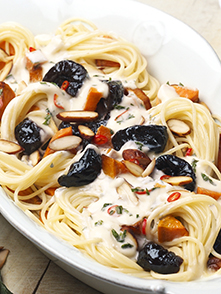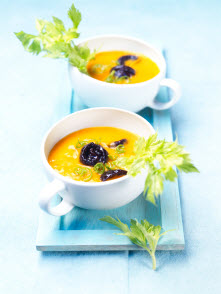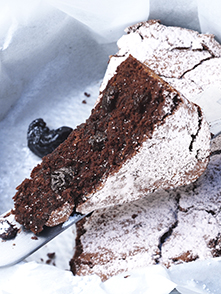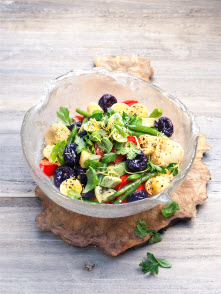We regularly publish some great healthy living tips, new recipes and other Prune tidbits on our blog
-
We very much fancy a slice of this Dense Chocolate Cake
Posted Fri, Nov 20, 20 by Sunsweet
Our Dense Chocolate Cake is wonderfully moist, super chocolatey and surprisingly simple to make. But there’s something that’s even more surprising. Our cake is a gluten-free bake and each delicious slice contains fewer than 400 calories. And it smells amazing while baking!
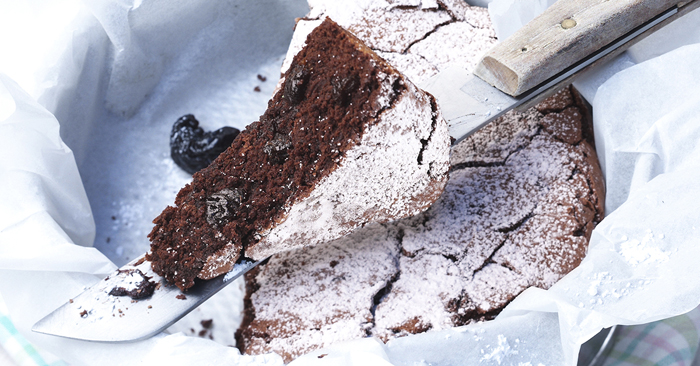
Ingredients
200 g dark chocolate
100 g butter, cubed
1 vanilla pod
5 eggs
1 pinch of salt
100 g sugar
150 g California prunes
3 tbsp. cocoa powder
Confectioner's sugar for dusting
Other:
Cake springform baking tin24 cm
Instructions
- Preheat the oven to 160° C (convection oven 140° C). Line spring form with baking paper. Chop chocolate. Cut butter into cubes. Place both into a bowl and melt over hot water. Cut vanilla pod in half and scrape out the seeds.
- Separate eggs and beat the egg whites, salt and sugar until stiff. Remove chocolate from water, allow to slightly cool, and then stir in the egg yolks. Stir in prunes, vanilla seeds, and cocoa powder, carefully fold in egg white.
- Pour the cake mixture into the springform baking tin and bake for 40 minutes. Allow the cake to cool and serve dusted with confectioner's sugar.
Other recipes you might be interested in...
-
The benefits of a well-stocked store cupboard
Posted Fri, Nov 13, 20 by Sunsweet
When you’re trying to make healthy choices around food, a little advance planning can go a long way. With a well-stocked fridge and store-cupboard and a repertoire of tasty, healthy and simple-to-prepare dishes up your sleeve, you won’t go too far wrong!
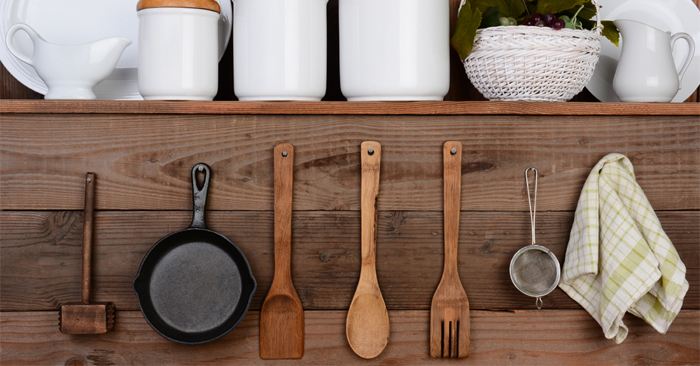
Temptation can be so hard to resist – especially when you’re feeling both tired and hungry. And that’s where healthy snacking comes into its own. Factoring in small snacks between meals can help to keep your appetite in check, your hunger satisfied, and help you to make healthier mealtime choices. Try to have a few healthy, grab-and-go options close to hand. Dried fruit – like SUNSWEET prunes - can be stashed in your desk drawer, your bag or your car’s glovebox so that you’re never too far away from a tasty treat.
Meals that Matter
Breakfast
It’s often described as the most important meal of the day. But it’s a meal that – when you’re up against it, time-wise – can all too often get skipped. Smoothies are the perfect solution for a speedy and nutrition-packed breakfast. Check out our recipe ideas for flavour combos that will suit the faddiest of eaters. And – if you’re really pushed for time – decant your smoothie into a travel cup and sip it on the run.
Lunch
Soup really is the ultimate lunch. Choose your recipe wisely and it’ll go a long way towards your 5-a-day. And, if you’ve a fussy eater in the family, soup can be buzzed super-smooth to surreptitiously deliver those nutrient-packed veggies. Why not take a look at our recipe pages? Most of our soups can be kept in the fridge for a few days or can even be frozen, for another time. Making friends with batch-cooking can be a great way to ensure that a healthy family meal is only ever a matter of minutes away.
Dinner
For mid-week meals, one-pot recipes really come into their own. You could prep the meal together, as a family, to boost that sense of connectedness. The tiniest of tots can wash veg, at the kitchen sink. And then - once your meal is prepped and popped into the oven – you’ll have a nice big chunk of quality time to enjoy together while the enticing aroma of dinner surrounds you.
Bon appetit!
Why not give prunes a go?
Did you know that prunes are surprisingly versatile? They can be used to add a nutritious boost to a variety of family meals - sweet and savoury – and their flavour adds both depth and richness. Try some of our delicious recipes!
Please Note: Prunes are good for digestion and help keep you regular, when 100g are eaten as part of a varied and balanced diet and an active lifestyle. Always consult a GP if you have any health concerns.
-
Spicy Hot Apple Cider with Prune Juice
Posted Fri, Nov 06, 20 by Sunsweet
There are few aromas more festive than that of mulled wine. But what about a glass of Christmas cheer without the alcohol? Our alcohol-free Spicy Hot Apple Cider with Prune Juice is a lovely alternative that the whole family will love. It makes a nice change from hot chocolate, too!

Ingredients
2 cups (480ml) Sunsweet® Prune Juice
2 cups (480ml) apple juice
2 cinnamon sticks
12 whole cloves
Instructions
- In a medium saucepan, combine prune juice, apple juice, cinnamon sticks and cloves; bring to the boil.
- Reduce heat; simmer for 15 minutes.
- Remove and discard cinnamon and cloves.
Other recipes you might be interested in...
-
Simple steps to boost your bone health
Posted Thu, Oct 01, 20 by Sunsweet
October 20th is World Osteoporosis Day. Incredibly, some one in three women and one in five men will be affected by the disease during their lifetimes. Osteoporosis has a weakening effect on the bones and it can lead to painful fractures and even to severe disability. Organised by the International Osteoporosis Foundation (IOF), World Osteoporosis Day launches a rolling, year-long programme of activity to raise awareness of the condition and effect positive change for sufferers.
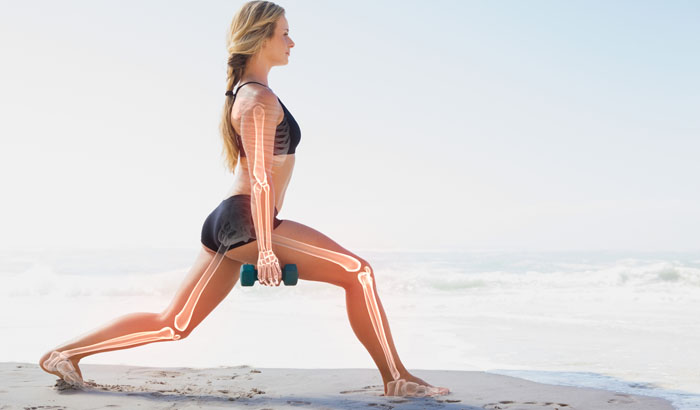
Maintaining strong and healthy bones, throughout your lifetime, is an excellent foundation for enjoying an active lifestyle well into old age. And simple steps like combining a good diet with weight-bearing exercise can help to boost bone health – whatever your age – and reduce the likelihood of developing osteoporosis in later life.
According to the IOF, micronutrients are substances - with ongoing research into their benefits – that can be important in maintaining bone health. The IOF actually recommend snacking on prunes because they are high in micronutrients, Vitamin K. And, on our website, we have recipes for some truly scrumptious prune-related treats. By tucking into delicious goodies like Prune Cookies, Creamy Vanilla Prune Popsicles and Prune Parfait, you'll be doing your tummy and your tastebuds a favour, as well as your bones!
Steps can be taken to prevent osteoporosis and the IOF, on the World Osteoporosis Day website, offer the following top tips for building strong bones:
- Regular exercise
- Bone healthy nutrients
- Avoid negative lifestyle habits
- Identify your risk factors
- Take osteoporosis medicine if prescribed
On the Sunsweet website – where you'll find the recipes for those super-tempting treats that we mentioned earlier - we have a section dedicated entirely to prunes and bone health. There really is a wealth of information including hints and tips for boosting bone strength and some important pointers from the IOF. Did you know, for example, that a 10% increase in peak bone mineral density - an indicator of strength - could delay the development of osteoporosis by up to 13 years?
From the Prunes and Bone Health section of our website, you can download informative and yet simple-to-read whitepapers on the following topics:
And, on the 8th October, we are delighted to be featuring an exclusive blog about the topic – appropriately entitled “Love Your Bones!”. The blog is certain to be an informative and enjoyable read so do make sure that you check it out.
PS: Don't forget to grab a few extra packs of those delicious Sunsweet prunes on your next shop, too!
-
Vegetarian Tortillas
Posted Tue, Aug 18, 20 by Sunsweet
Had your fill of soggy sandwiches and paltry pastries? In the market for something fresh and flavoursome and perfectly portable? Bid farewell to boring lunch-time fayre and give our yummy Vegetarian Tortillas a go. At your desk. As part of a springtime picnic. They'll liven up your lunch-time, wherever you choose to eat them!
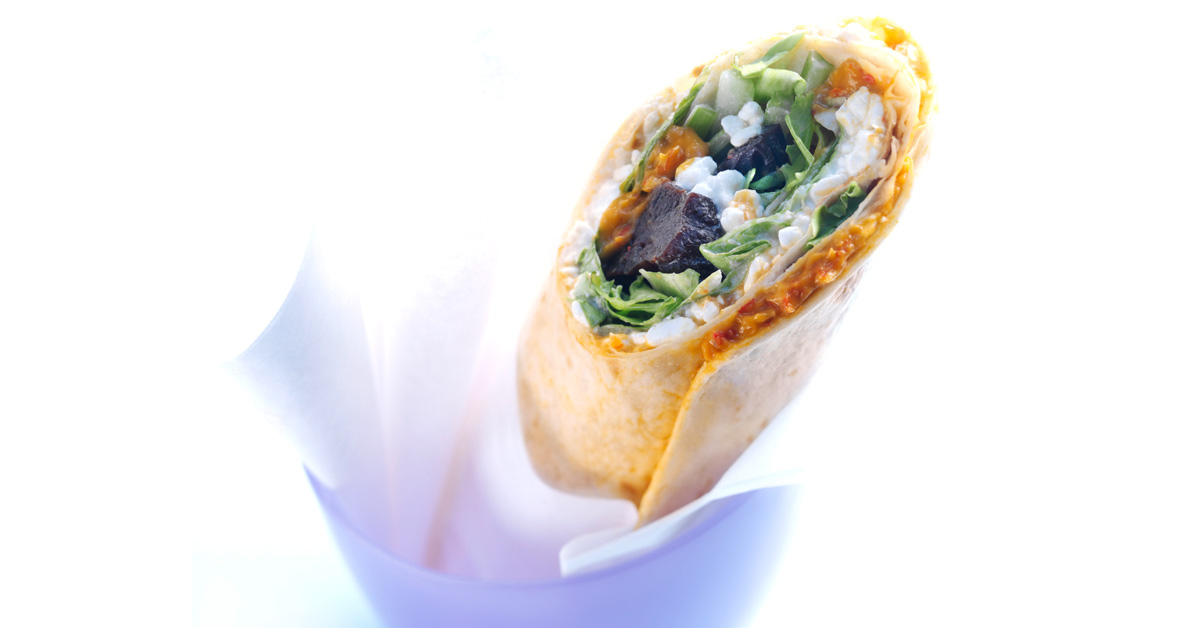
Ingredients
1 ripe avocado
3-4 tablespoons of hot chilli sauce
Zest of ½ organic lemon
Salt
¼ head iceberg lettuce (approx. 150 g green leaves)
1 celery stick
4 soft tortilla wraps (58 g each)
200 g low fat cottage cheese
200 g Sunsweet prunes
Instructions
- Chop iceberg lettuce into thin slices, wash and shake dry. Cut avocado in half, remove pit and spoon out the avocado meat. Mash avocado with a fork. Add hot chilli sauce and lemon zest and mix well. Season with salt. Clean and wash celery and cut lengthwise into very thin slices.
- Spread first the avocado mixture, then the cottage cheese on the tortilla wraps. Coat half of the wrap with iceberg lettuce. Place the prunes and celery lengthwise on the wrap. Roll up the wrap very tightly and cut diagonally in half.
Other recipes you might be interested in...
-
Granola Muesli Bars
Posted Tue, Aug 04, 20 by Sunsweet
There are times – throughout a busy week - when only a sweet treat will do. Packed full of nutritious goodies, like dried fruit and nuts, our Granola Muesli Bars are no ordinary sweet treat. With a cuppa or glass of milk, the bars are a scrummy pick-me-up. And they're perfect for breakfast on-the-run. Ring the changes - with different fruit and nut combos - to create firm, family favourites.
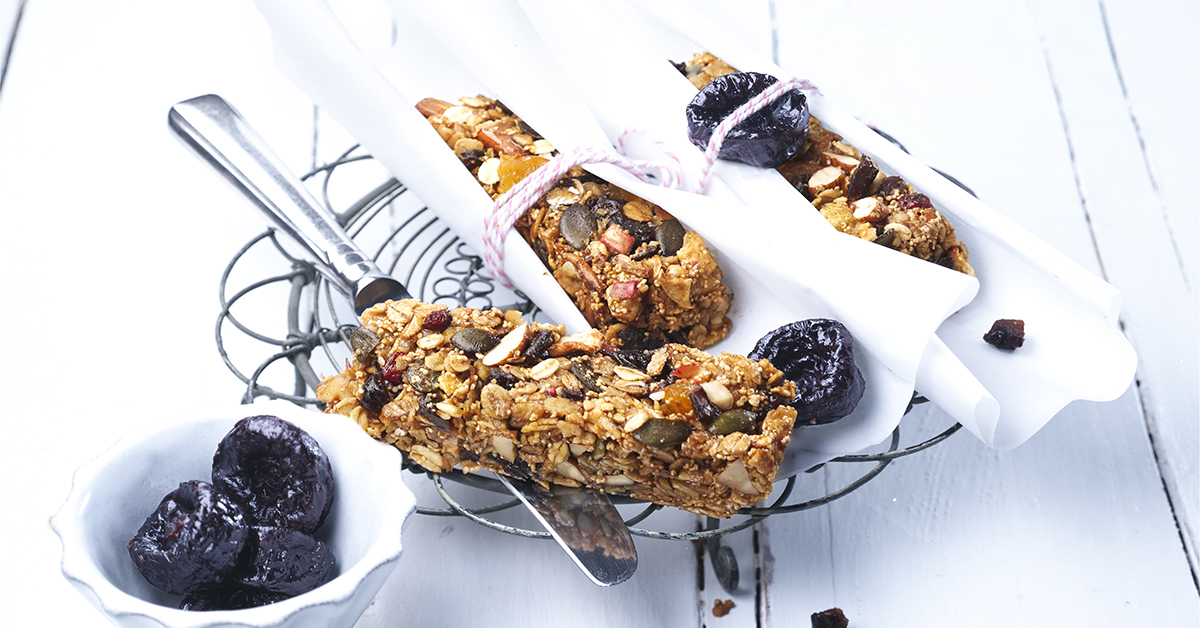
Ingredients
100 g brown sugar
50 g honey
150 g soft butter
1 egg
1 tsp. cinnamon powder
200 g California prunes
60 g dried apricots
200 g crunchy oat flakes
100 g granola
100 g nuts (e.g. almonds, walnuts, or hazelnuts)
Salt
Instructions
- Beat sugar, honey, and butter until fluffy. Gently stir egg, 1 pinch of salt and the cinnamon into the mixture. Chop prunes and apricots coarsely and fold together with oat flakes, granola, and nuts into the butter-egg mixture.
- Spread the mixture on a lined baking tray and bake in oven at 190° C (convection oven at 170° C) for 30-40 minutes. Allow to cool, then cut into bars. Wrap individually in parchment paper or in plastic foil.
Other recipes you might be interested in...
-
Prunes: Your Great Hack to Reducing Your Sugar Intake
Posted Thu, Mar 12, 20 by Sunsweet
As humans we’re programmed to crave high calorie foods – the survival of our ancestors depended on it. The human body evolved to make the most of high energy sweet foods when they were available, storing the excess energy for when we needed it most. These days we no longer have to hunt and gather like our ancestors (although we’ve got some great paleo recipes for anyone who follows this diet!), and we’re lucky enough not to have to worry about lengthy periods of food scarcity. But our bodies still love and crave those sugary foods which too often we don’t convert to energy and instead store in our bodies as fat.
The World Health Organisation (WHO) recommends that adults limit their sugar intake to 25 grams per day – about 6 teaspoons. However, it’s easy to exceed that amount each day – depending on how you start your day you might reach your limit before you leave the breakfast table! In fact, the average consumption for adults in Western Europe is just over 100 grams of sugar, that’s about 25 teaspoons. And while you might think you limit your sugar to the teaspoon you add to your favourite cuppa, there is often sugar hidden in processed foods.
Aside from the obvious effects of sugar such as tooth decay and weight gain, there are other ways it can impact your health. According to WHO being overweight can increase the risk of:
- Diabetes
- Heart Disease
- Musculoskeletal disorders (especially osteoarthritis)
So how can you square those sugar cravings with the need for a healthy balanced diet? Enter your great hack – the humble but amazing prune! A prune is a dried plum, with no added sugar and contains vitamin B6, manganese and copper which all support normal release of energy from foods. Prunes can also help you achieve your 5-a-day of fruit and vegetables. And studies have shown that because they help you to feel full (satiety) they’re a healthy choice to help control overeating. They make a great addition to your kid’s lunch box – resist the urge to pack a biscuit as a treat and pop in a few prunes instead! A bag of prunes in the car or your gym bag can help you to avoid the temptation to buy sugary treats at the petrol station or after working out, and serve as a great energy source to keep you going throughout your day.
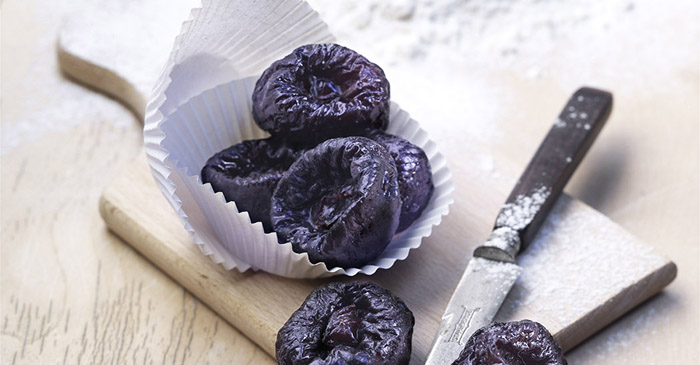
If you love cooking and baking you’ll find prunes could be your new favourite secret ingredient. You can use prunes to reduce the amount of free sugars in baking recipes. Or whip up a batch of prune puree – you can use it to reduce the total sugar content of your favourite recipe! You can even use prune purée as a substitute for butter – great for reducing the fat in your diet and for vegan recipes. Instead of serving up a bowl of cereal loaded with hidden sugars, why not start your day with a nourishing bowl of Fruity Porridge? For an afternoon treat, these Prune Muffins made with prune puree are low fat and full of fibre. Our website has lots of recipes, sweet and savoury, if you’re stuck for inspiration.
Sunsweet® Prunes and Prune Juice are dried plums from California. Prunes have a low GI-score, meaning they slowly release energy so they shouldn’t dramatically affect blood sugar or insulin levels. In addition, both prunes and prune juice contain fibre. Prunes have 7.1grams per 100grams – about a quarter of your daily needs.
Our farmers still do the gathering that our ancestors once did. They harvest the plumpest, juiciest Californian plums which are dried as prunes or made into prune juice. So next time you’re at the supermarket, hunt down a packet of delicious SUNSWEET Prunes and a carton of refreshing SUNSWEET Prune Juice!
Prunes and prune juice can be enjoyed as part of a varied and balanced diet and a healthy lifestyle. For detailed information on the nutrition content of prunes and prune juice please visit our products page.
-
The Top 6 Questions We’re Asked About Prunes
Posted Thu, Feb 27, 20 by Sunsweet
Everything you ever wanted to know about prunes – and, quite possibly, a little bit more besides - all in one place! Check out our official, super-informative Q&A on all things Sunsweet prune-related. The Top 6 Questions We’re Asked About Prunes.
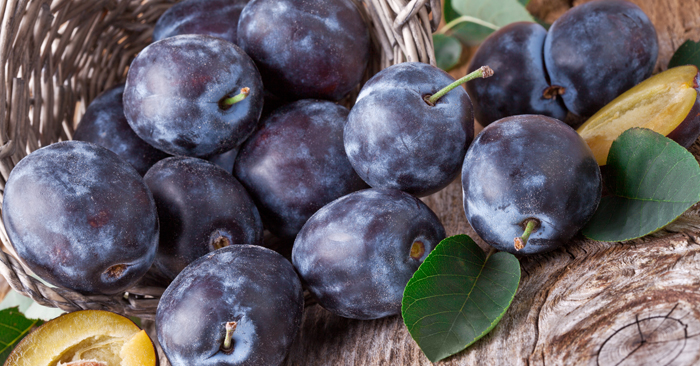
- Are prunes gluten-free?
- Are prunes suitable for people with diabetes?
- Do prunes contain sugar?
- What effect do prunes have on the digestive system?
- What is the connection between prunes and strong bones?
- And, our favourite, just how exactly does a plum become a prune?
Reports suggest that – for a whole host of reasons - as many as one in four of us are now attempting to live gluten free. Gluten is the protein that is found in grains like wheat. And with things like bread, pasta and cereal being such a staple of everyday meal planning, going gluten free isn’t easy. But the good news? All fruit is naturally gluten free and so a serving of prunes or a glass of prune juice can be enjoyed whenever you like. You can even add them to your favourite coeliac-friendly recipes to give them a sweet and fruity twist.
Experts recommend that to keep blood sugar levels steady, we aim for a diet with an overall GI of 50 or less. But, happily, that doesn’t mean that sweet and tasty snacks like Sunsweet prunes are a no-no. Harvard Medical School found that the GI of pitted prunes is around 29 making them a low-GI fruit that doesn't dramatically affect blood sugar and insulin levels.
Prunes contain no added sugar. They are simply dried plums: one plum becomes one prune, just with the water removed. During the plum-prune drying process, sucrose is hydrolysed to glucose and fructose so prunes contain minimal sucrose. And prunes are classed as whole fruit so they can contribute towards achieving your 5-a-day, as well as boosting your daily fibre intake.
For centuries, prunes – and prune juice - have been associated with good digestive health. But now there are scientific findings to support that association, too. Research has shown that - when 100g of prunes are eaten daily, as part of a varied and balanced diet and an active lifestyle – they can assist with normal bowel function just as much as fibre supplements. In fact, prunes should be considered as a first line therapy when it comes to maintaining a healthy bowel.
Research suggests that prunes, due to the nutrients they provide, could be beneficial for bone health. Prunes contain vitamin K and manganese that - among other functions - have direct benefits for bone health. Prunes are also a source of vitamin B6 which helps make healthy blood cells in our bone marrow and maintain normal hormone levels including those involved in bone health.
It’s simple, really. Sunsweet prunes are a special variety of sun-ripened plums that have been dried to remove some of the water. A variety with an exceptionally high sugar content, these "Improved French" variety of plums give Sunsweet prunes their distinctively delicious taste; rich and fruity with notes of creamy vanilla. The dried fruit contains similar levels of nutrients – such as fibre - to fresh plums, while offering the added benefit of year-round availability and a long shelf life.
Please Note: Prunes are good for digestion and help keep you regular, when 100g are eaten as part of a varied and balanced diet and an active lifestyle. Always consult a GP if you have any health concerns.
-
Dietary Fibre 101
Posted Fri, Feb 21, 20 by Sunsweet
What exactly is fibre? Why does the body - every body - need it? What happens to our body if we don’t get enough of it? And how can we ensure that we keep getting plenty of it? Read on for everything you - and your family - need to know about dietary fibre.
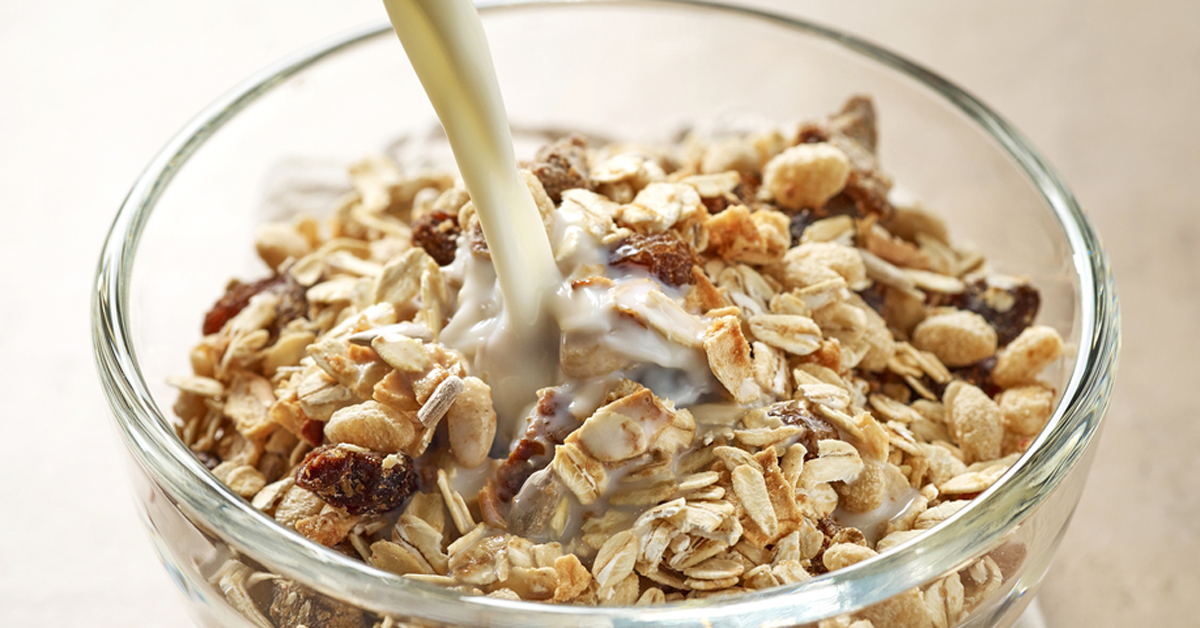
Our Dietary Fibre 101
OK. We admit that as health topics go, dietary fibre - and the role that it can play in contributing towards a healthy and normally functioning body – is far from being a glamorous one. And yet, dietary fibre is an important health topic. With a seemingly endless increase of pressure on our time and the proliferation of quick, convenient and very nutrient-poor meals, many of us simply do not get enough fibre from the food we eat on a regular basis.
But what is dietary fibre?
In a nutshell, dietary fibre is the tiny parts of things like cereal, vegetables and fruit that cannot be digested in the small intestine. Instead, this dietary fibre passes further along in the digestive system before most of it gets broken down by bacterial action in the colon. Increasing dietary fibre – as part of a healthy and balanced diet - can help to soften stools, making them easier to pass and helping to keep the complex cogs of the digestive system moving!
If you would like a more detailed understanding of how the digestive system works then our 'whistle stop tour of the digestive system' will be of interest to you.
And it seems that fibre has an even more crucial role to play, too. The World Cancer Research Fund (WCRF) reckon that dietary fibre is protective against bowel cancer. Around 12% of bowel cancers in the UK are linked to eating insufficient fibre, less than 23 grams a day.
Types of dietary fibre
Dietary fibre is typically divided into two groups:
- Insoluble Fibre:
This is made up of the skins of fruits, the stalks and leaves of vegetables and the husks and hard coats of seeds. Insoluble fibre is more slowly broken down and its bulk helps with the evacuation of stools.
- Soluble Fibre:
This is more completely fermented in the colon, it retains fluid, softening the stools and making them easier to pass.
Many plant components contain both soluble and insoluble components of dietary fibre. For example, the skins of prunes are composed of insoluble fibre and the pulp and juice are composed of soluble fibre
Dealing with constipation
If you do become constipated, it is even more important than ever to aim for at least 5 portions of fruit or vegetables a day. Fibre-packed dried fruits and natural, unsweetened juices can both count towards this target. Just three prunes a day count for one of your ‘5-a-day’ portions!
Highly processed foods are best avoided as these tend to be higher in fat, salt and sugar and are often lower in fibre. Get into the home-cooking habit. Our recipe pages are a great place to look, for healthy inspiration.
The role of fluids
To help to keep things moving, digestively-speaking, it’s important to make sure that you drink plenty of fluid. If you’re actively taking steps to increase the amount of fibre in your diet, be sure to increase the amount of fluid that you drink, too. The body is super-efficient at extracting fluid from the colon when it is needed for bodily functions. And even slight dehydration can lead to harder stools that are more difficult to pass. Six to eight glasses of fluid a day - water or diluted fruit juices are good choices – is a useful rule of thumb.
If you’d like to find out more about the role of dietary fibre – especially if you suffer from IBS with constipation – please do take a look at our booklet. It’s packed with expert hints and tips:
Please Note: Prunes are good for digestion and help keep you regular, when 100g are eaten as part of a varied and balanced diet and an active lifestyle. Always consult a GP if you have any health concerns.
- Insoluble Fibre:
-
Our Beetroot Carpaccio with Fried Bacon Prunes makes a pretty starter!
Posted Fri, Feb 14, 20 by Sunsweet
When it comes to entertaining, it’s handy to have a trick or two up your sleeve. Our Beetroot Carpaccio with Fried Bacon Prunes is more of an assembly job than a recipe – but it couldn’t look prettier and more impressive on the plate! Make sure you slice the beetroot finely and cook the bacon till it has a bit of crunch. The contrasting textures will combine to create a super-tasty starter.
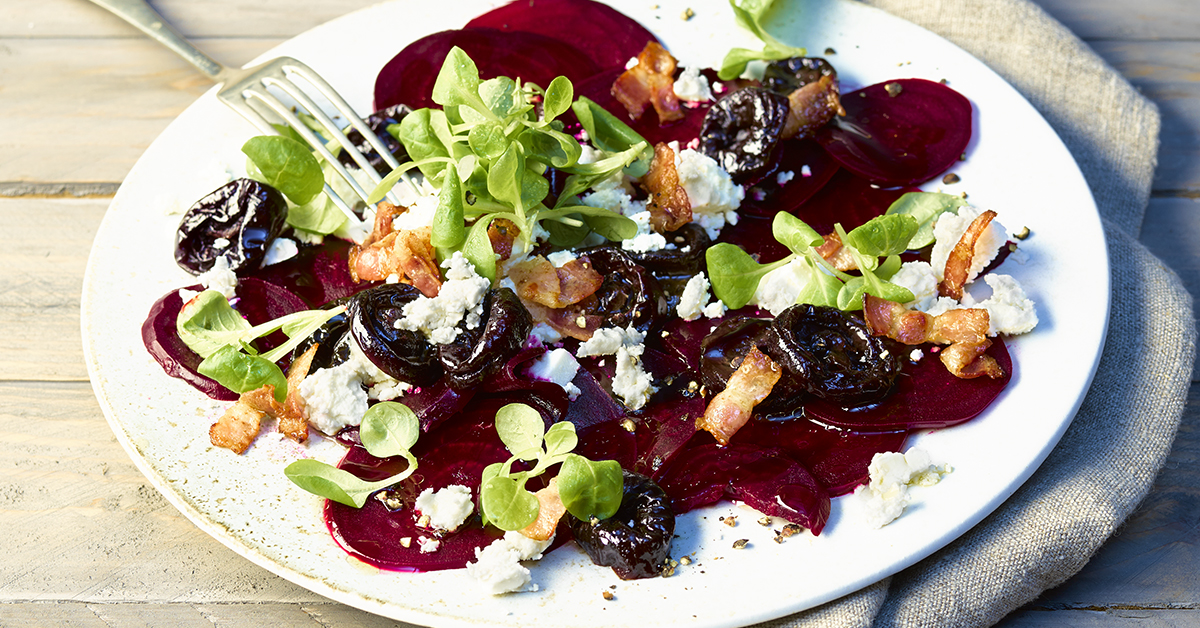
Ingredients
- 125 g kitchen-ready small-leaved lamb’s lettuce
- 500 g precooked skinned beetroot
- Freshly ground black pepper
- 150 g Feta
- 7-8 slices of bacon (125 g) (alternative: Pancetta)
- 100 g Sunsweet prunes
- 50-60 ml lemon juice
Instructions
- Wash lamb’s lettuce, thoroughly drip dry. Cut beetroot into wafer-thin slices, place on 4 large plates and sprinkle with a little pepper. Put lamb’s lettuce around the edges of beetroot. Crumble Feta over this.
- Cut bacon into 2 cm wide pieces. Halve prunes. Fry bacon in a coated pan at medium heat without adding any fat until light brown and slightly crunchy. Remove pan from stove. Add prunes, briefly stir fry and heat. Immediately spread everything with the exuded fat and arrange widely on the beetroot and lamb’s lettuce. Sprinkle with lemon juice and immediately serve.
Tip: Ciabatta or wheat bread goes well with this.
Refining: additionally sprinkle salad with Crema di Balsamico balsamic vinegar, if necessary also instead of lemon juice.
Other recipes you might be interested in...
-
5 Top Tips on Comfort Eating ... without piling on the pounds!
Posted Thu, Jan 16, 20 by Sunsweet
So, what do you think…is it really possible to indulge yourself with tasty, comforting and warming food, without piling on the pounds? Or, come the summer, do you fully expect to be dieting? At Sunsweet, we believe that comfort does not necessarily have to mean calorific.

5 Top Tips on Comfort Eating...without piling on the pounds!
Gaining weight. It's something that most of us accept as “just one of those things”. The World Health Organisation reports that more than 1.4 billion adults are overweight, the findings of which could prove to be very significant.
Why do we crave Comfort Food in winter?
Comfort Foods tend to be high in carbohydrate and sugar, and there are lots of theories about why we crave these heavier foods more in the winter months. There's a school of thought that winter weight gain could be our survival instinct kicking in; that we're fattening ourselves up to get through the colder months and keep our mood buoyant. And there's another more practical thought: when the days get shorter and temperatures drop, our resolve for healthy living plummets and we descend into a circle of eating more, moving less and, ultimately, gaining weight.
So what can be done to counter the sluggishness caused by overindulging?
Our 5 top tips
Plan ahead to maximise meal-times and super-charge your snacks
- Seize the opportunity to stock up the store cupboard with more nutritious snack alternatives. Dried fruit – like Sunsweet prunes – keep well, pack a nutritious punch and are surprisingly versatile adding a rich, fruity depth to both sweet and savoury dishes.
- Plan meals ahead – and, where possible, prepare them in advance - so that “I’m starving” feeling doesn't automatically equate to grabbing something quick, calorie-laden and unhealthy. Soups and stews are nourishing and warming and if you choose your recipe wisely can be low in fat and calories, and high in taste and comfort, too. Our Minestrone with Prunes Soup is a lovely veggie option with less than 300 calories.
- Drinks and snacks can be tasty, little pick-me-ups. But the ‘easy-to-reach’ sugar laden snacks and super-sized coffees can be a disaster, calorie-wise. High-fibre snacks served with a warm drink – herbal teas are perfect - can help to fuel the body and keep everything moving. And an attractively presented plate of fruit, fresh or dried, couldn't be simpler or quicker.
- Life would feel pretty dull without the occasional treat. And from time to time, if you really fancy something chocolatey, there's nothing sinful about giving in to temptation. Do a bit of research though to come up with healthier alternatives. Our Paleo Chocolate Pudding is an excellent example of a treat that is flavourful, tempting, looks great, and under 410 calories, too!
- Naturally sweet, prunes and prune juice have no added sugars, just naturally-occurring ones; a quick and easy way to keep sweet cravings at bay. Also did you know that a prune puree (blitzing the fruit with water) can be used to successfully replace fat in cakes and cookies? You can find out more, here. And, finally... A warm bath. Super-cosy PJs. Flickering candlelight. A roaring fire. And a good old-fashioned hug. Totally Comforting, Totally Indulgent. Totally Calorie Free!
Enjoy!
-
50% of all New Year’s Resolutions Fail – Will yours?
Posted Thu, Jan 09, 20 by Sunsweet
This New Year, why not resolve to do something a little bit different? You could resolve to treat yourself well with delicious food that is super-nourishing, too. You could resolve to create a plan of activity for your family that is, primarily, fun. And who knows? Maybe, just maybe, this year's resolutions will be the ones that you'll actually keep!

How to move your New Year’s resolutions into the 50% that succeed!
How many times have we all proclaimed (almost brazenly!) – to ourselves and to friends - lists of positive, well intentioned New Year's Resolutions which we ‘resolve to include in our lives with energy, spirit, enthusiasm, passion and intent, and yet, statistically many resolutions are set to fail, before they’ve actually commenced! An American study published in the Journal of Clinical Psychology estimated that, every New Year, some 50 percent of the population makes resolutions around things like weight loss, exercise, smoking and finances but 6-8 weeks later their promises are backsliding.
And yet, thankfully, Hope Springs Eternal.
So what can we do, to give ourselves a better chance of maintaining our resolve?
Create an ‘Area of Focus’
Peter Bregman, writing in the Harvard Business Review, has offered insights into why the setting of specific goals often fail; ‘we’re taught to make them very specific, very measurable and time-bound .... but it turns out that those very characteristics are precisely the reasons goals can backfire’. Indeed, 6-8 weeks on when we haven’t met those high achieving goals we confidently proclaimed at the start of the New Year, we frequently begin to cheat, bluff ourselves, and lose momentum!
Bergman proposes: ‘Instead of identifying goals, consider identifying Areas of Focus’.
- an Area of Focus establishes activities you want to spend your time doing; a goal defines an outcome you want to achieve.
- an Area of Focus is a path; a goal is a result.
- an Area of Focus settles you into the present; a goal points to a future you intend to reach.
And the beauty of the final outcome is that by narrowing the focus, our resolve becomes real and habit forming.
And we can certainly see the benefits of aiming to maintain a healthy lifestyle rather than introducing harsh exercise regimes and punitive crash diets. It makes sense for healthy habits to be an everyday part of life rather than things that are introduced in a panic on the first of January only to be abandoned a short time later. Having a buddy to support you in your healthy endeavours is an excellent idea, too. You can share hints and tips. You can celebrate successes and learn from failures. You can cheer each other on, to keep focused and stay committed, when the going gets tough.
Five inspirational tips
If you're in need of a little inspiration, our Healthy Living Guide is an excellent place to start.
If you rely on your motivation alone, that life-affirming, energy-boosting, healthy-weight-maintaining exercise session may never happen! So here are 5 tips on creating a winter activity plan that will help you keep to your Area of Focus in check.- Change your behaviour by changing your thinking – exercise isn't a chore, it's fun!
- Dig out the high-vis, a brisk walk can be refreshing on a cold and crisp evening.
- Discover your inner child. If we're lucky enough to have snow, get out there and play!
- Sign up for a course. Something fun, like a jive class. Something soothing, like yoga. Whatever floats your boat.
- And finally, if the weather really is too foul to leave the house, YouTube is chock-full of workout videos for all ages, tastes and fitness levels.
-
Prune-power in a glass! You can never have too many scrummy smoothie recipes
Posted Thu, Jan 02, 20 by Sunsweet
Combining avocado, apple and spinach leaves and flavoured with honey, lemon, ginger and super-sweet prune juice this is a smoothie that packs a powerfully nutritious punch. And it’s an easy way to get lots of healthy fruit and veg into the family’s fussiest eaters!
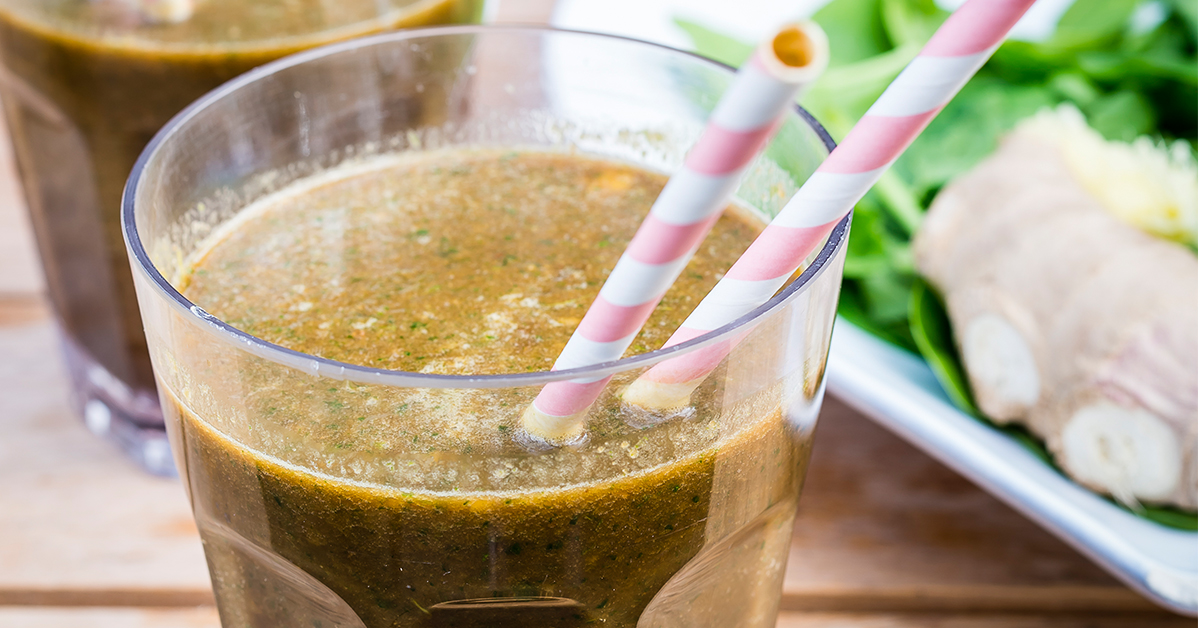
Ingredients
½ an avocado
A small apple, peeled, cored, and roughly chopped
A handful of spinach leaves, washed
A tablespoon of honey
The juice of ½ a lemon
A knob of ginger, about 2cm long – peeled
300 ml Prune juice
Instructions
- Place all of the ingredients except for the ginger and the Prune juice, into the blender.
- I like to grate my ginger with a fine grater, so if you have one I recommend you do the same; if you don’t have one then simply chop the ginger as finely as you can and add it.
- Pour in enough prune juice to barely cover the ingredients, then simply blend everything well.
Other recipes you might be interested in...
-
Tip-top digestion: it’s what everybody wants for Christmas!
Posted Tue, Dec 24, 19 by Sunsweet
Most of us don’t give a second thought to our digestive systems, until they start to get out of sync. And then it’s hard to think about anything else… Be kind to your tum, this Christmas. Tucking into Sunsweet prunes and prune juice is a simple way to start!
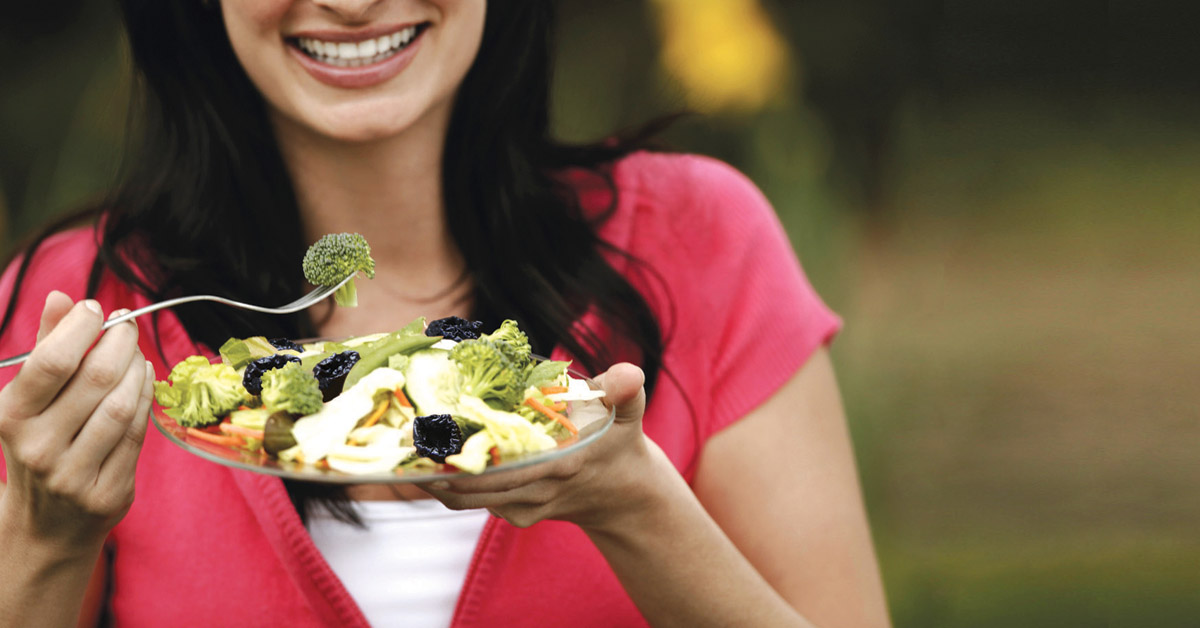
OK, we understand that digestion isn’t the most festive of topics. But it’s at this time of year, when the food that we eat gets richer and more plentiful and – apart from dashing frenetically from shop-to-shop - our lifestyles become more sedentary, that we really need to keep on top of things, digestion-wise. Digestion is a complex chemical and physical process and a healthy digestive system can play an important role in our overall sense of well-being. If our digestion gets out of synch, the entire body can feel its effects with symptoms like bloating, reflux, constipation and diarrhoea.
It’s hard not to overindulge at Christmas. Most of us are guilty of stocking up our homes with deliciously tempting – but not always healthy! – food and drink. Traditional yuletide treats are typically low in fibre and they can be richer and more protein-packed than we’re used to, too. This - in combination with a higher intake of alcohol, a lower rate of physical activity and sky-high stress levels - can place extra demands on the digestive system.
Top Tips for Improving digestion
There is good news, though! Read on for some quick tips on improving digestion:
- We know it’s hard but try to take some regular time out of the ‘busy-ness’ to simply relax. Walking with a friend, some gentle yoga stretches, listening to music, whatever helps you to unwind.
- Be mindful of what you’re eating, especially when you’re busy and distracted. Chew well and eat slowly so that you’re more likely to stop eating before you get too full.
- It makes sense to avoid ice-cold drinks while eating, because they can contribute to a sluggish digestion.
- And try eating prunes and drinking prune juice daily!
Why prunes?
For years, prunes and prune juice have been associated, anecdotally, with digestive health. But now there are scientific findings to extoll the benefits of prunes. Prunes help to promote normal bowel function just as well as fibre supplements and they should be considered as a first line therapy when it comes to maintaining a healthy bowel.
So, the inclusion of Sunsweet prunes and prune juice in your everyday diet certainly makes a lot of sense! 100% natural, our products can be enjoyed by the whole family including children, pregnant women and the elderly. Prunes are surprisingly versatile and can add a nutritious boost to family meals at any time of the year. Their flavour can add depth and richness to comfort foods, like tempting mousses and slow-cooked stews. They can even add a fresh and fruity note to salads and smoothies, too.
Please Note: Prunes are good for digestion and help keep you regular, when 100g are eaten as part of a varied and balanced diet and an active lifestyle. Always consult a GP if you have any health concerns.
-
Don't let stress play havoc with your health, this Christmas!
Posted Fri, Dec 13, 19 by Sunsweet
Stress. An inevitable part of modern life, especially at Christmas? Or something that we can – and should – take steps to influence and improve? Slow down the pace, this Christmas, and - you never know – you might actually enjoy it! Check out our tips on reducing those health-impacting stresses to enjoy more precious time with family and friends.

Can you make this Christmas your happiest and healthiest yet?
There's a school of thought that stress is an inevitable aspect of contemporary life. And we all know that Christmas can be an emotionally challenging time; a heady combination of family ‘differences’, money worries, general fatigue and the slipping of healthy habits, , can play havoc with our stress levels.
Stress – a widespread issue
The World Health Organisation defines stress as “the reaction people may have when presented with demands and pressures that are not matched to their knowledge and abilities and which challenge their ability to cope”. Most of us can relate, in some way, to those feelings, especially at Christmas. Expectations are sky-high but with so much going on, often the energy levels and resources, required to deliver on those expectations, can be low. So what can you do to help reduce stress in your life?
Stress-busting tips
Here are three things that you could try, today,:
- Try to figure out the source of your stress, if you can. It could be your place of work. It could be your home. The places where we spend most of our time are good places to start in tracking down that source.
- Where possible, identify the steps that you could take to effect positive changes. And then make those steps. Start with small changes, at first, especially if you're feeling vulnerable.
- Make sure that you have some stress-busting strategies at your fingertips. Listen to soothing music. Practice mindfulness. Chat to a friend. Go for a walk. Take a long, hot bath. These are all excellent methods of de-stressing and couldn't be more simple.
Stress and tummy troubles
Digestion is a super-sensitive process, all too easily compromised by the stresses and strains of contemporary living. Stress can exacerbate a range of symptoms – including poor appetite and tummy troubles. These vary from person to person, but when the digestive system gets out of step – for whatever reason - the entire body can feel its unwelcome effects like bloating, constipation and indigestion.
Prunes can help!
Prunes have long been associated with digestive health and now there are scientific findings to support this. Research suggests that prunes should be considered as “a first line therapy” to maintain a healthy bowel. The research found that when 100g of prunes were eaten on a daily basis, they helped to support normal bowel function.
Why not check out our Digestion 101, too, to discover more hints and tips on maintaining a healthy digestive system?
With our very best wishes for a healthy, happy and stress-free Christmas!
-
How can good digestive health keep you feeling fabulous?
Posted Thu, Mar 28, 19 by Sunsweet

Let's be honest - when it comes to discussing digestive health, most of us would rather steer clear of the topic altogether. But now more than ever, it is important to realize that digestion plays a significant role in your overall health! You may know that the primary function of the digestive tract is to break down the food we eat so that it can be used as fuel by the body. What is less well-known is the importance of the GI (gastrointestinal) tract to your immune system and your total body's health. In fact, the GI tract is often referred to as the body's "second line of defense" against potentially harmful pathogens that cause disease (the first defense being the skin!). You've been pampering your skin for years, but have you been making the right dietary decisions to promote a healthy GI tract? Probably not.
The digestive system is stronger than you think - for example, few bacteria can survive the acidic environment of the stomach. It may not sound pretty, but the fact is the abundant mucous and digestive enzymes secreted by the digestive tract helps destroy potentially harmful microorganisms. This "good bacteria" keeps the "bad bacteria" at bay, so we essentially have a classic case of good versus evil on our hands, and it is your job to join forces with the good by maintaining a healthy digestive system. This is not only necessary from a nutritional standpoint but also for optimizing your body's overall immunity.
Today we are overwhelmed by many products targeted toward improving digestive health. As a snack or an ingredient, prunes and prune juice make it easier to bring added nutrition into your everyday diet and make a valuable contribution to our health
-
No Time to work out?
Posted Wed, Jan 23, 19 by Sunsweet
You might not have time to go to the gym or do a fitness class, but that doesn't mean you cannot get fit. The trick is to try and bring fitness into your everyday life and disguise your exercise by doing things you enjoy. Do you like to dance, cycle, walk the dog or does vigorous housework de-stress you? All these things are exercise – they get your heart pumping and burn calories.
So no more excuses, everyone can increase their fitness by incorporating these small changes.
Here are our top ten tips:
- Don't use the "I've no time to go to the gym" as an excuse. Never has home exercise been so accessible or affordable. If you have a games console already, invest in a Wii Fit or chose from one of the multitude of fitness DVD's available. Just 30 minutes 3 times a week would make a big difference to your fitness levels.
- Take public transport and leave the car at home. While it may mean timing your event more carefully, it saves fuel, money and is better for the environment. Also, get off one stop early and walk the rest of the way.
- Remember exercise does not have to mean sport. Housework, shopping or gardening can also count towards your daily exercise intake.
- When you encounter a stairs and an escalator side by side, chose the stairs. Yes it's easier to stand than walk but walking up stairs is a great mini workout to incorporate into your daily routine.
- When going to the cinema, shopping centre or any other place with a large car park, make a habit of parking furthest from the door. In the time spent looking for the "optimum" spot near the door, you will have already walked across the car park and had a little fresh air and exercise.
- Walk! It's free, healthy, weight bearing and can be done anywhere. You don't need special equipment other than sensible walking shoes or runners and can take place from right outside your front door.
- Don't waste your precious time going to an expensive gym on the edge of town. Find a local class near you by looking at the list of events in your local community centre or church hall. As well as getting fit, you may even get to know some of your neighbours as you salsa, step or zumba together.
- Find a fitness buddy. Instead of catching up with friends over a coffee, tie those laces, put on those jackets and walk and talk.
- Forget the car for short journeys - make a habit of walking to your local shop, school or friend's house.
- Create more time. If you truly feel that you have no extra time for exercise, then create some! Get up a half an hour earlier, or turn off your television in the evening for a half an hour or make a decision to go to bed a little later after your evening walk.
-
Harvest time with Sunsweet!
Posted Thu, Aug 31, 17 by Sunsweet
As summer begins to draw to a close, the thoughts of many of us will be turning towards the harvest, towards reaping the benefits of what we have sown. Whether that’s harvesting in a literal sense, like gathering the fruit and veg that we planted in the spring. Or harvesting in a more metaphorical sense, like benefiting from the healthy routines that we put in place earlier in the year.

Although the months when harvest-time takes place vary, depending on where you are in the world, the word itself comes from the Old English hærfest meaning the period between August and November, the autumn. In the USA, Thanksgiving is held on the fourth Thursday in November. But in Britain, Harvest Festivals are traditionally held on the Sunday closest to the Harvest Moon. The Harvest Moon is the full moon that falls closest to the autumnal equinox and it’s usually towards the end of September.
Whenever they take place, though, the festivals are the perfect time to express gratitude for the abundance of fresh and healthful foods that are available to us. They’re a wonderful reminder to get together with friends and family – whenever we have the opportunity - for feasting and for fun. But amid the celebrations, there’s a more serious side too. Many countries have a long-standing tradition of remembering those less fortunate, at harvest-time, of sharing the abundance that many of us are lucky enough to be able to take for granted.
At Sunsweet, we have a century-long heritage of planting, tending and harvesting and somewhere in the region of 300 farmer members share their knowledge about cultivation with their peers. By late summer, our orchards in California are ready for harvest. Finally! This follows:
- The 4 to 6 years that the growers must wait before their trees bear fruit.
- The spring, when the orchards become covered – so fleetingly - in a fragrant blanket of white blossom.
- The summer, when growers must irrigate the orchards – via an extensive network of reservoirs - using water from the Sierra Nevada Mountains.
The plums that become prunes are tree-ripened. Experienced growers can determine the optimum time for harvesting by assessing the fruit’s firmness and sugar content. Harvesting, helped by a machine that gently shakes each tree trunk, ensures that the tree-ripened plums never touch the ground, and this marks the end of the crop cycle for our growers.
We’ve created a super-interesting video that shows the Sunsweet harvest. And our website is packed full of fascinating facts about all things prune-related. Why not check them out?
Please Note: Prunes are good for digestion and help keep you regular, when 100g are eaten as part of a varied and balanced diet and an active lifestyle. Always consult a GP if you have any health concerns.
-
Never give a second thought to heart health? Discover why that has to change.
Posted Fri, Feb 05, 16 by Sunsweet
Although the official stats around heart disease are sobering – it's the leading cause of death worldwide, after all - there are some simple steps that you can take, around things like diet and exercise and stress-management, to help to effect positive change. Do your heart good, this February, with a helping hand from Sunsweet.

Valentine's Day. It's the perfect excuse to give a little thought to the health of our hearts. But as delightful as all the lovey-dovey stuff is, just for the moment, we're not talking about our hearts in a romantic sort of way. Because the stats around heart health - from internationally-respected organisations like the British Heart Foundation – are sobering.
- Coronary heart disease is the leading cause of death worldwide.
- Cardiovascular disease causes more than a quarter of all UK deaths.
Heart disease – the risk factors
Risk factors for heart problems include diabetes, high blood pressure, high blood cholesterol levels and what the British Heart Foundation refer to as 'modifiable risk factors', these are things like physical inactivity and poor diet. Stats from the British Heart Foundation claim that, in the UK:
- 25% of adults are obese.
- 50% of women don't get enough exercise.
- And just 25% of adults manage to get their 5-a-day of fruit and veg.
The organisation undertakes research into the effects of stress, too. And although it isn't necessarily a direct risk factor for heart disease, the coping mechanisms that many of us choose to counter stress – things like skipping exercise and becoming more sedentary in our daily routines, eating foods that are unhealthy in a bid to comfort ourselves and drinking too much alcohol or smoking – just might be.
The benefits of prunes
Our lifestyle, including diet, exercise and the way that we handle stress, has a fundamental impact on our wellbeing, both physically and emotionally. And so a common-sense attitude towards health – like choosing to eat more healthily, more of the time – is really important. A nutritious contribution to a healthy and balanced diet, and a tasty step towards 5-a-day, Californian prunes are sweet, super-tasty and high in fibre. But did you know that they may have heart-health boosting properties, too?
- Prunes are high in potassium, which supports normal blood pressure.
- Prunes are naturally saturated-fat-free and reducing the consumption of saturated fat helps to maintain normal blood cholesterol levels.
- Prunes are a source of vitamin K, which contributes to normal blood clotting.
You can check out a more comprehensive list of the health benefits of prunes, here :
Try our trio of health-tricks
When the going gets tough and the motivation for sticking to healthy habits disappears, it can be helpful to some health-tricks up your sleeve.
- A walk and talk with a friend means fresh air and exercise, an opportunity to let off steam and rather conveniently, put some distance between you and unhealthy temptations.
- Build-up a repertoire of nutritious and quick-to-prepare recipes. Our website is an excellent resource. Our Crispy Tofu Tandoori with Prune Sauce , for example, will limit the lure of the Indian takeaway menu
- Create a list of treats for when you really need to up the feel-good factor. Whether it's dimming the lights, popping on some candles and relaxing in front of the fire. Soothing your body – and mind - in a warm, scented bath. Or enjoying a slice of damn-fine chocolate cake. Because, at the end of the day, just a little of what you fancy may do your heart the world of good!
Please Note: Prunes are good for digestion and help keep you regular, when 100g are eaten as part of a varied and balanced diet and an active lifestyle. Always consult a GP if you have any health concerns.
-
Step into Spring! And be inspired by our article to breathe new life into that fitness regime.
Posted Wed, Apr 08, 15 by Sunsweet
According to a recent YouGov study, our resolutions are usually focused on exercise, weight and health. Other health related issues, like giving up smoking and cutting back on alcohol consumption, are the next most popular resolutions. And resolutions of a more altruistic nature - spending more time with the family, undertaking charity work – are a little further down the list. All good stuff. But how do you keep yourself motivated and ensure that you meet your very worthwhile goals?

1) Be clear, be realistic and be good to yourself
It’s important to be really clear about what you want to achieve. “Getting Healthy”, for example, is probably too vague to be meaningful. Think about what “healthy” actually means to you; is it about fitness, weight, energy, mood… Once you've decided on a long-term goal - a vision - it’s useful to set yourself a series of smaller milestones, too. These need to be actionable and achievable. And – when you've ticked them off – their accomplishment is a fabulous excuse for a mini celebration, along the way! If you haven’t exercised for years, for example, simply being active every day - for 30 days – is far more realistic than signing yourself up for a half-marathon. Check out this TED talk, for inspiration:
2) Get support
When our resolve is flagging or when we face unforeseen hurdles in the meeting of our goals, it can be helpful to have somebody on our side, cheering us on from the side-lines. Identify other people who can help you to keep on track. This could be a supportive friend, an online group or even something like The Sunsweet 14-Day Challenge.
3) Use your technology
Don’t forget that technology can be an ally, too. You could create a simple spread sheet that helps you to keep track of your training progress, for example. You could create some homemade posters – with inspirational quotations and images - that you can distribute throughout your home and office, to help to keep you motivated. And whether your New Year’s resolution is to have a change of career (Jobcentreplus), to stop smoking (Cessation Nation) or to put an end to aimless net surfing (Self Control), as the saying goes, there’s an app for that!
4) Boost your energy
New regimes can be tiring, both emotionally and physically. Prunes are a source of vitamin B6, which can help you to feel less tired. And vitamin B6 – along with copper and manganese, of which prunes are also a source – supports the normal release of energy from foods. So grab yourself a handful of prunes. A sweet and tasty way to top up those energy levels!





